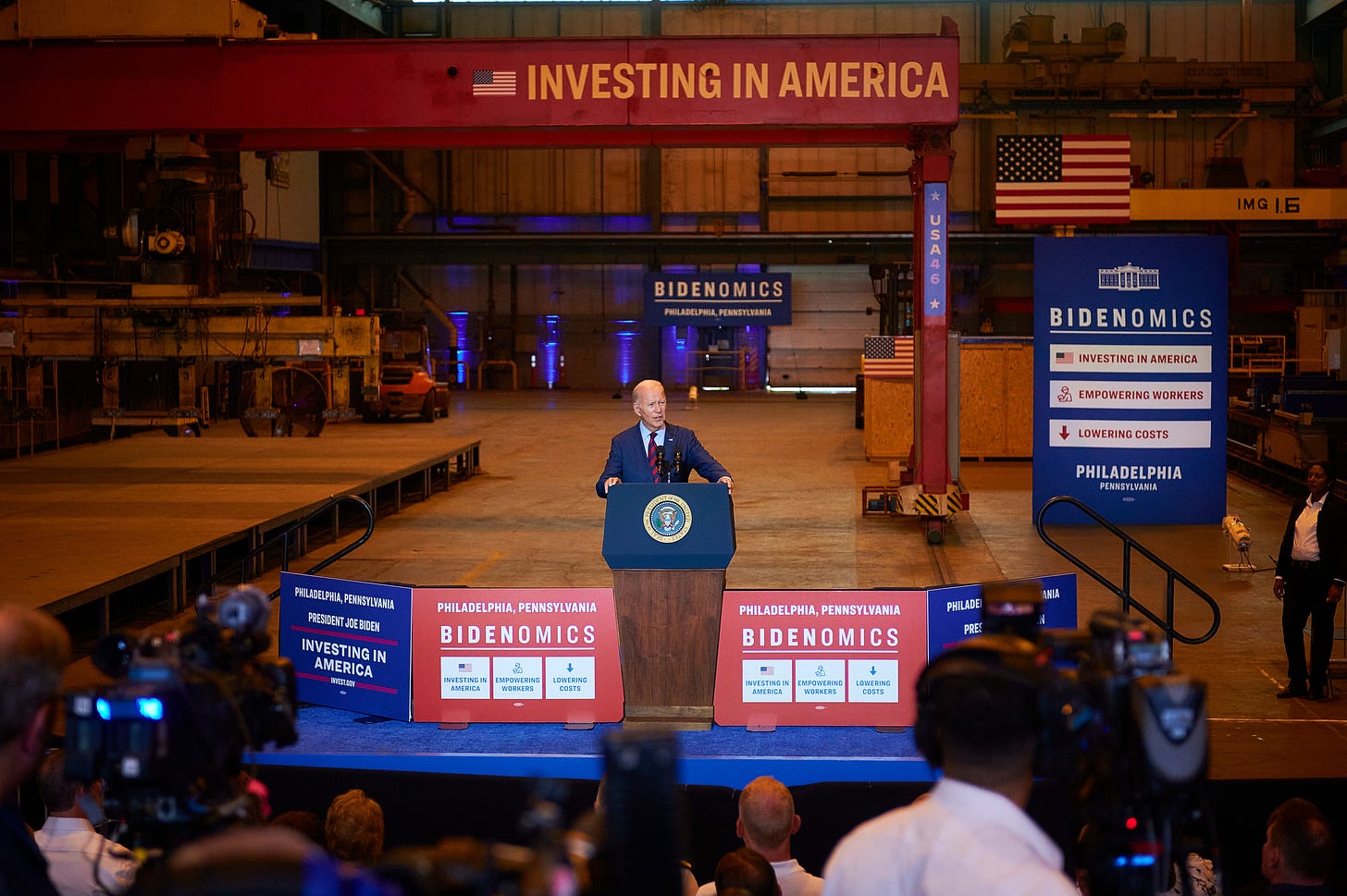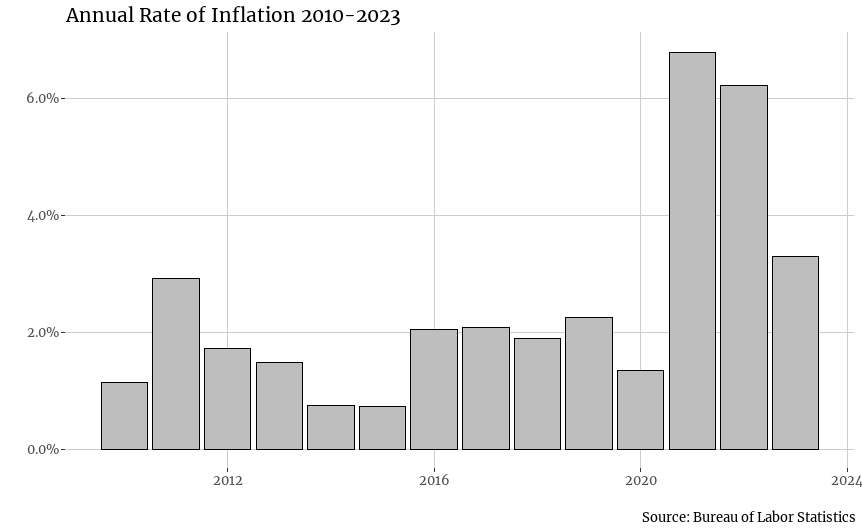It IS the Economy, Stupid!
Some columnists and economists complain the President doesn't get the credit for the economy he deserves. American's are unhappy with the economy, so maybe he is.
Back in 1992, while Bill Clinton was in the middle of his first campaign for President, his political strategist James Carville scolded fellow campaign workers to remember the importance of the economy to voters. “It’s the economy, stupid,” Carville wrote on a campaign HQ blackboard, and that became the rallying cry of Clinton’s successful Presidential campaign.
Thirty-two years later, it’s still the economy. But this time some economists, and by extension the President, are calling voters stupid.
Before being knocked off the front page by the Trump verdict, the New York Times prominently posted an article on its website Thursday morning that carried the headline, “Why Are People So Down About the Economy? Theories Abound.”
Written by Times economic reporter Jeanna Smialek, the piece is essentially a wondering aloud about why the general public doesn’t give President Biden the credit he deserves for his record on the economy. “The job market is booming, and consumers are still spending, which is usually a sign of optimism,” writes Smialek. “But if you ask Americans, many will tell you that they feel bad about the economy and are unhappy about President Biden’s economic record.”
A little more than a week ago New York Times columnist Paul Krugman, an economist, wrote a similar article, titled “Return of the Inflation Truthers,” also questioning why Biden wasn’t getting his due. The illustration accompanying the piece shows a man surrounded by balloons and confetti while his hands cover his ears, his eyes are tightly shut, and a pained expression on his face—the implication being that he's trying to ignore something he should instead be celebrating.
I learned two things from reading Krugman’s column. I learned the word “truther,” which, according to the American Heritage Dictionary, means “one who believes that the government or another powerful agency is conspiring to conceal the truth about its role in an event.” The other thing I learned is just because you’re an economist doesn’t mean you know s**t about the economy—at least not the economy that matters to everyday Americans.
According to Krugman, most Americans are in “disinflation denial.” While inflation has fallen from 9% to just over 3%, he complains, “many Americans don’t believe that inflation has fallen, and there are a number of commentators with large audiences insisting that there has been no improvement.”
Part of this denial, Krugman claims, is that the general public confuses “the level of prices” with the “rate of change in prices.” But if you look closely at Krugman’s argument, he’s the one in denial. While admitting that “stuff costs a lot more than it did a few years ago,” he admonishes those of us not as educated in the subtleties of economics for not understanding that “the rate at which they’re rising has fallen drastically,” and that President Biden should be getting credit for this. I beg your pardon Mr. Krugman, but I don’t think the general public is confused at all.
While things like GDP, yield curves, “Multivariate Core Trend inflation”, and jobs reports, mean a lot to economists—they are mostly abstractions to the rest of us. It’s a good thing that economists worry about these things, though as an economist friend of mine says, “talk to three economists, get five opinions.” But what matters to most Americans are prices.
To buttress his claim that the public is not giving President Biden enough credit for taming inflation, Krugman includes the following graph showing that inflation has slipped from an historic high of 9% in July 2022 to “only” around 3% now. But what he ignores, and what most Americans can’t, is that inflation is cumulative.
You might look at the graph above and say “OK, Krugman is right, inflation is coming down.” And that’s how he, some other economists, as well as President Biden, want you to see it. To a point, it’s true. Inflation has moderated, though it’s still much higher then when Biden took office and above the Federal Reserve’s target rate of 2%. But there’s another way to look at the very same data—and it’s a perspective they’d prefer you not see.

I may not be an economist, but I can add, and just because inflation has fallen from an unsustainable 9% to 3% doesn’t mean that the 9% has gone away—it stays tacked on to prices. That 3% that Krugman crows about is just added to the previous two consecutive years of 6% plus inflation.
The price of goods that make up the Consumer Price Index (CPI) has increased more in the three years of the Biden presidency than in all of the previous eleven. What cost $141 in February 2021 now costs $196, a $45 increase. Compare that to the $100 basket of goods in February 2010 that cost $141 in February 2021, a $41 increase over eleven years. That’s not spin. That’s FOCNN fact.
It’s not me, it’s you.
Try as they might, Krugman and the President have failed to convince the average American that things are as hunky-dory as they say. “Americans’ flagging confidence in the national economy,” reports the public opinion survey firm Gallup, “is also evident in their continued mentions of the economy and inflation as two of the most important problems facing the U.S.”
Since 2001 Gallup has been measuring the public’s confidence in the President's “ability to do the right thing for the economy.” And while prices are rising, the public’s confidence in the President is falling. “[C]onfidence in President Joe Biden to recommend or do the right thing for the economy,” Gallup reports, “is among the lowest Gallup has measured for any president since 2001.”
Given that the economy might be Biden’s political Achilles Heel, it’s not surprising that he and left-leaning economists continue to “piss in our ears and tell us it’s raining” by insisting the economy is great when Americans are really upset about the rising cost of living. No one likes to be condescended to, and having economists like Krugman lecture us that the economy is great because “Multivariate Core Trend inflation,” isn’t so bad, or that WE are confusing high prices with inflation, is an insulting academic argument when many people are feeling the real pressure of rising costs. It’s economic gaslighting.
Even Krugman admits that “Grocery prices are up about 25 percent, and overall they aren’t falling,” and the average price of a gallon of gas is up more than $1 since President Biden took office. It’s difficult to get pumped up over the President’s handling of the economy when people are paying so much for groceries or at the pump.
And yet, pundits like Krugman continue to claim it’s OUR problem, not the President’s. “But if you insist that inflation hasn’t come way down,” Krugman wrote, “the problem isn’t the economy; it’s you.” Perhaps the real problem for the President is that the public IS giving hm all the credit he deserves.








I enjoyed today's analysis, but would have liked for you to touch on the fact that the same people complaining about gas & groceries are the same ones booking cruises & spending $$ on other luxury items. So I feel it's illogical to complain.